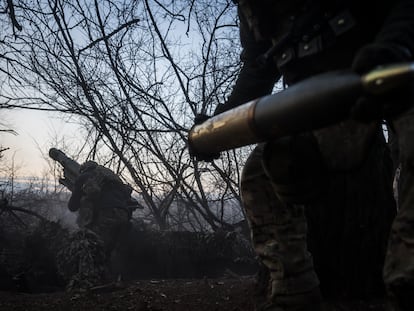Siberian Battalion targets Putin from Ukraine’s trenches
An armed unit of dissident Russians fighting for their country’s ethnic minorities proposes attacking the Kremlin’s circle of power


There are three Russian armed groups fighting alongside Ukraine. All of them oppose Vladimir Putin and believe a political solution is no longer viable. The far-right Russian Volunteer Corps (RDK) and the more liberal Freedom of Russia Legion have been in battle the longest. The Siberian Battalion, part of the Ukrainian Foreign Legion, is the most recent addition. Their goals are to decentralize power in Russia for greater regional autonomy and to “liberate” ethnic minorities.
Control is the nom de guerre of one of the oldest soldiers in the Siberian Battalion. He won’t say his exact age, just that he’s over 40. He volunteered to fight for Ukraine in the 2014 war against pro-Russian separatists in the Donbas region. Born in Moscow to ethnic Tatar parents, his grandparents were deported from the Crimean Peninsula by the Soviet Union, later annexed by Russia in 2014. Control likes to study history. He knows the origins of every building surrounding the Kyiv park where we interviewed him. “If you want to know what the future holds, dive into history. That’s when you’ll realize that this war was inevitable.”
Control draws a comparison between Crimea and Ukraine with Spain and Catalonia. He sees the self-governance and preservation of Catalan identity in Spain as a model to emulate. His comrade-in-arms, Johnny, says the Siberian Battalion is fighting for the liberation of ethnic minorities in Russia and wants to see a state/federal model of government similar to the United States.
Johnny, originally from St. Petersburg, joined the Siberian Battalion in October 2023 after leaving Russia a year earlier. The battalion saw its first official combat action that same month. Initially starting with 60 volunteers in Ukraine, Siberian Battalion representatives now claim to have significantly more combatants, and told Euronews in January that they aim to have 300 soon. While the exact troop strength of the three Russian armed groups fighting with Ukraine has not been disclosed, estimates from various media sources place it at slightly over 1,000.
Johnny came to the battalion through the Civic Council in Poland, a Russian dissident association that recruits volunteers into the ranks of the Armed Forces of Ukraine. The Civic Council had previously collaborated with the RDK but broke off relations in 2023 due to the RDK’s ultranationalist ideology. Russians who contact the Civic Council to volunteer in Ukraine are now directed to the Siberian Battalion.
The RDK and the Siberian Battalion fight together against Kremlin troops, despite being political opposites. Vladislav Amosov, the founder of the Siberian Battalion, tried to join the RDK but says he was rejected for not being Slavic. Amosov, a retired military officer of Yakut heritage, then led other ethnic minority fighters to form the Siberian Battalion.
The three groups revealed their political differences during a joint press conference in Kyiv last March. RDK founder Denis Kapustin pointed to the Siberian Battalion as a prime example of these differences. A Siberian Battalion representative named Jolod (a pseudonym) stated that their shared goal is to oust Putin from power, along with pushing for power decentralization from Moscow and self-determination for the Russian Federation’s people.
Control identifies four ethnic minorities that Putin is trying to dissipate through the Russification of their lands: Yakuts, Chuvashs, Buryats and Evenks. He says the Russian Army targets these groups to fight in Ukraine, thereby depleting ethnic populations. How do they feel when they kill a fellow Russian in combat? Aren’t they victims too? “What do I feel?” Johnny said. “I feel the kick of the rifle against my shoulder. I’d try to stop any invader, even if he was my next-door neighbor. You can always choose not to back down, like we did.”
Targeting Putin’s inner circle
The Razumkov Center, a Ukrainian institution for political and security studies, released a demographic study on April 10. It found that 25% of respondents think the war will only end if Russia collapses. The Siberian Battalion members see this as a given. “This war can’t be won on the battlefront. Putin keeps sending troops — he doesn’t seem to care about their lives. He’ll just keep sending them until he gets what he wants,” Johnny said. “This war will end in Moscow once we deal with Putin and his inner circle.” He believes tactics need to be changed, to go into Russia and eliminate the president’s loyalists. “If they can assassinate opponents all over Europe, why can’t we go into Russia and do the same?” Control asks.
Wouldn’t the European Union and the United States reject those tactics? Control and Johnny wouldn’t comment on that but firmly believe that there is a new world war underway between Western democracies and authoritarian nations like Russia, Iran, China and North Korea. Politics no longer has a place in Russia, they say. Control says the Civic Council can produce revolutionary leaders, like the Bolsheviks who came back from European exile to topple the tsar, but “the soldiers of the revolution are living in Russia.” Control didn’t care for Alexei Navalny’s centralist, authoritarian vision of Russia, but says his death “proves politics is over and done with. Putin relies on violence to hold onto power, so we have to meet that with even greater force.”
Sign up for our weekly newsletter to get more English-language news coverage from EL PAÍS USA Edition








































